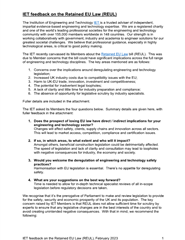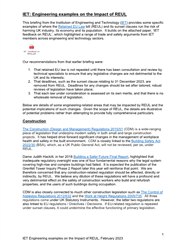It is safe to say, the UK Government’s Retained EU Law Bill (REUL) has provoked strong responses that largely stay off the fence.
The Bill, making its way through the parliamentary process as we speak, seeks to take laws and regulations inherited from the EU off the statute books. If it passes on schedule, some 4,000 laws could simply be ‘sunsetted’ on December 31st 2023, many without undergoing technical scrutiny by experts.
When I asked for the views of IET members in a recent discussion post: What are the implications of the Retained EU law (REUL) on the engineering and technology sector , they didn’t hold back.
A few were unconcerned about changes, saying they would adapt to them. However most respondents appear concerned about what laws will face the chop, what will replace them and the risk of instability in the transition between one set of laws and another. Then there is the risk of unintended consequences. Who knows how removing these laws will affect a range of areas flagged up by members, such as health and safety, working hours and harmonisation with international standards.
Another concern is the speed with which this is being done. The idea that EU legacy laws will lapse on December 31st 2023 makes for an impossibly tight timetable for review. In fact the Regulatory Policy Committee, which provides an independent view on UK legislation, ‘red-rated’ REUL as not fit for purpose.
Overall, some of the main areas to be flagged up were
- The implications of deregulating engineering and technology legislation;
- Harm to UK-EU trade, innovation, investment and competitiveness;
- A lack of clarity and little time for industry preparation and compliance;
- The absence of opportunity for legislative scrutiny by industry specialists;
The risk is that removing EU law will undermine the effectiveness of much interlinked UK law.
Four questions were asked (here with summarised IET Members’ answers):
- Does the prospect of losing EU law have direct / indirect implications for your engineering and technology sector?
Changes will affect safety, clients, supply chains and innovation across all sectors. This will lead to market access, competition, compliance and certification issues.
- If so, in which areas, to what extent and who will it impact?
Amongst others, beneficial construction legislation could be detrimentally affected. The speed of legislation and lack of clarity and consultation may lead to loopholes with negative consequences for industry, the economy and society.
- Would you welcome the deregulation of engineering and technology safety practices?
Harmonisation with EU legislation is essential. There’s no appetite for deregulating safety.
- What are your suggestions on the best way forward?
Time is needed to allow for in-depth technical specialist reviews of all in-scope legislation before regulatory decisions are taken.
While everyone accepts Parliament’s role in making and reviewing legislation, IET members are concerned that the Bill would lack sufficient time for expert scrutiny and may then produce adverse unintended consequences.
The IET recommends no retained EU law is repealed before there has been specific consultation and review by technical specialists. Using sunset laws here does not make for robust legislation. We want to make sure the proposed changes do not damage UK growth and its economic, social, health and safety, environmental and security interests.
Share your thoughts in the comments below.

